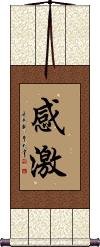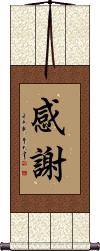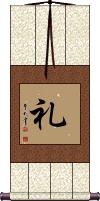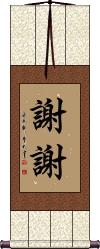Many custom options...
And formats...

Thankfulness in Chinese / Japanese...
Buy a Thankfulness calligraphy wall scroll here!
Personalize your custom “Thankfulness” project by clicking the button next to your favorite “Thankfulness” title below...
Thankfulness
感激 is thankfulness or being grateful for what you have.
It is an attitude of gratitude for learning, loving, and being. Appreciate the little things that happen around you and within you every day. Think positively. Thankfulness brings contentment.
Different meaning in Japanese - more like "deep emotion," "impression," "inspiration" - not recommended for a Japanese audience.
Gratitude / Thanks
感謝 is gratitude; the feeling of being grateful or thankful.
You can think of this as being a formal way of expressing thankfulness in Chinese, Japanese Kanji, and old Korean Hanja.
Respect
Politeness, Gratitude and Propriety
礼 is one of the five tenets of Confucius.
Beyond respect, 礼 can also be translated as propriety, good manners, politeness, rite, worship, or an expression of gratitude.
We show respect by speaking and acting with courtesy. We treat others with dignity and honor the rules of our family, school, and nation. Respect yourself, and others will respect you.
 Please note that Japanese use this simplified 礼 version of the original 禮 character for respect. 礼 also happens to be the same simplification used in mainland China. While 禮 is the traditional and original version, 礼 has been used as a shorthand version for many centuries. Click on the big 禮 character to the right if you want the Traditional Chinese and older Japanese versions.
Please note that Japanese use this simplified 礼 version of the original 禮 character for respect. 礼 also happens to be the same simplification used in mainland China. While 禮 is the traditional and original version, 礼 has been used as a shorthand version for many centuries. Click on the big 禮 character to the right if you want the Traditional Chinese and older Japanese versions.
This is also a virtue of the Samurai Warrior
See our page with just Code of the Samurai / Bushido here
See Also: Confucius
Thank You / Xie Xie
謝謝 is how to say thank you in Chinese. It is pronounced a bit like “shea shea” as in the English word for shea butter. Except you pronounce the X like “sh” but with your tongue firmly at the bottom of your mouth.
Unless you are putting this wall scroll near the exit of your store or restaurant to thank customers for coming, it is a bit of an odd selection. A gift of thanks to another person should be a more personal selection with more meaning than a simple thank you. Although common to write xie xie inside a card or letter of thanks.
Technically, this can be pronounced in Japanese but in Japan, it’s still the Chinese way to say thank you. It’s like an English speaker saying "gracias" (Spanish word for thank you).
Thank You / Arigato
These search terms might be related to Thankfulness:
Appreciation and Love for Your Parents
Appreciation of Truth by Meditation
Gratitude / Thanks
Not the results for thankfulness that you were looking for?
Below are some entries from our dictionary that may match your thankfulness search...
| Characters If shown, 2nd row is Simp. Chinese |
Pronunciation Romanization |
Simple Dictionary Definition |
感謝 感谢 see styles |
gǎn xiè gan3 xie4 kan hsieh kansha かんしゃ |
More info & calligraphy: Gratitude / Thanks(n,vs,vt,vi) thanks; gratitude; appreciation; thankfulness |
恩 see styles |
ēn en1 en on おん |
More info & calligraphy: Gracefavour; favor; obligation; debt of gratitude; (given name) Megumu Grace, favour. |
礼 see styles |
reiji / reji れいじ |
More info & calligraphy: Respect |
謝 谢 see styles |
xiè xie4 hsieh ja じゃ |
More info & calligraphy: Chea(surname) Ja To thank; return (with thanks), decline; fall; apologize; accept with thanks. |
義理 义理 see styles |
yì lǐ yi4 li3 i li giri ぎり |
More info & calligraphy: Giri(noun - becomes adjective with の) (1) duty; sense of duty; honor; honour; decency; courtesy; debt of gratitude; social obligation; (can be adjective with の) (2) in-law; relation by marriage; (given name) Yoshimasa reason |
謝恩 谢恩 see styles |
xiè ēn xie4 en1 hsieh en shaon しゃおん |
More info & calligraphy: Shayne(n,vs,vi) (expression of) gratitude |
大丈夫 see styles |
dà zhàng fu da4 zhang4 fu5 ta chang fu masurao ますらお |
More info & calligraphy: Man of Character(adjectival noun) (1) safe; secure; sound; problem-free; without fear; all right; alright; OK; okay; (adverb) (2) certainly; surely; undoubtedly; (int,adj-na) (3) (colloquialism) no thanks; I'm good; that's alright; (4) (だいじょうぶ only) (archaism) (See 大丈夫・だいじょうふ) great man; fine figure of a man; (given name) Masurao a great man |
志 see styles |
zhì zhi4 chih yuki ゆき |
aspiration; ambition; the will (1) will; resolution; intention; ambition; aim; goal; (2) kindness; goodwill; kind offer; (3) gift (as a token of gratitude); (female given name) Yuki Will, resolve, 志意; 心志; also data, records. |
答 see styles |
dá da2 ta tō こたえ |
to answer; to reply; to respond answer; reply; response; solution A bamboo hawser, to draw out, to respond, reply, return thanks. |
虧 亏 see styles |
kuī kui1 k`uei kuei |
to lose (money); to have a deficit; to be deficient; to treat unfairly; luckily; fortunately; thanks to; (used to introduce an ironic remark about sb who has fallen short of expectations) |
鳴 鸣 see styles |
míng ming2 ming mei / me めい |
to cry (of birds, animals and insects); to make a sound; to voice (one's gratitude, grievance etc) (female given name) Mei Cry, sound, note of a bird, etc.; Oh ! alas ! to wail. |
お礼 see styles |
orei / ore おれい |
(1) (polite language) thanks; gratitude; (2) (polite language) manners; etiquette; (3) (polite language) bow; (4) (polite language) reward; gift; (5) (polite language) ceremony; ritual |
万謝 see styles |
bansha ばんしゃ |
(noun/participle) many thanks; sincere apologies |
会釈 see styles |
eshaku えしゃく |
(noun/participle) (1) slight bow (as a greeting or sign of gratitude); nod; salutation; (noun/participle) (2) consideration; thoughtfulness |
依蒙 see styles |
yī méng yi1 meng2 i meng emō |
thanks to |
八種 八种 see styles |
bā zhǒng ba1 zhong3 pa chung yagusa やぐさ |
(place-name) Yagusa (布) 施 Eight causes of giving―convenience; fear; gratitude; reward-seeking; traditional (or customary); hoping for heaven; name and fame; personal virtue. |
労い see styles |
negirai ねぎらい |
appreciation; thanks; gratitude |
厚礼 see styles |
kourei / kore こうれい |
heartfelt thanks |
厚謝 see styles |
kousha / kosha こうしゃ |
(n,vs,vt,vi) deep gratitude |
報徳 see styles |
houtoku / hotoku ほうとく |
repayment of someone's kindness; showing one's gratitude; moral requital; (place-name) Houtoku |
報德 报德 see styles |
bào dé bao4 de2 pao te |
to repay debts of gratitude; to repay kindness |
報恩 报恩 see styles |
bào ēn bao4 en1 pao en houon / hoon ほうおん |
to pay a debt of gratitude; to repay a kindness (noun/participle) repaying a kindness; gratitude To acknowledge, or requite favours. |
多虧 多亏 see styles |
duō kuī duo1 kui1 to k`uei to kuei |
thanks to; luckily |
多謝 多谢 see styles |
duō xiè duo1 xie4 to hsieh tasha たしゃ |
many thanks; thanks a lot (noun/participle) (1) many thanks; hearty thanks; (noun/participle) (2) profuse apology |
大恩 see styles |
dà ēn da4 en1 ta en daion だいおん |
great debt of gratitude; great obligation great mercy |
奉還 奉还 see styles |
fèng huán feng4 huan2 feng huan houkan / hokan ほうかん |
to return with thanks; to give back (honorific) (noun, transitive verb) restoring (power, etc.) to the emperor; (place-name) Houkan |
御礼 see styles |
onrei / onre おんれい orei / ore おれい |
(1) (polite language) thanks; gratitude; (2) (polite language) manners; etiquette; (3) (polite language) bow; (4) (polite language) reward; gift; (5) (polite language) ceremony; ritual |
微意 see styles |
bii / bi びい |
(humble language) small token (of gratitude); my (humble) feelings |
忝涙 see styles |
katajikenamida かたじけなみだ |
tears of gratitude |
恩仇 see styles |
ēn chóu en1 chou2 en ch`ou en chou |
debt of gratitude coupled with duty to avenge |
Click here for more thankfulness results from our dictionary
The following table may be helpful for those studying Chinese or Japanese...
| Title | Characters | Romaji (Romanized Japanese) | Various forms of Romanized Chinese | |
| Thankfulness | 感激 | kangeki | gǎn jī / gan3 ji1 / gan ji / ganji | kan chi / kanchi |
| Gratitude Thanks | 感謝 | kan sha / kansha | gǎn xiè / gan3 xie4 / gan xie / ganxie | kan hsieh / kanhsieh |
| Respect | 禮 礼 | rei | lǐ / li3 / li | |
| Thank You Xie Xie | 謝謝 / 謝々 谢谢 | shie shie / shieshie | xiè xie / xie4 xie / xie xie / xiexie | hsieh hsieh / hsiehhsieh |
| Thank You Arigato | ありがとう | arigato | ||
| In some entries above you will see that characters have different versions above and below a line. In these cases, the characters above the line are Traditional Chinese, while the ones below are Simplified Chinese. | ||||
Successful Chinese Character and Japanese Kanji calligraphy searches within the last few hours...








